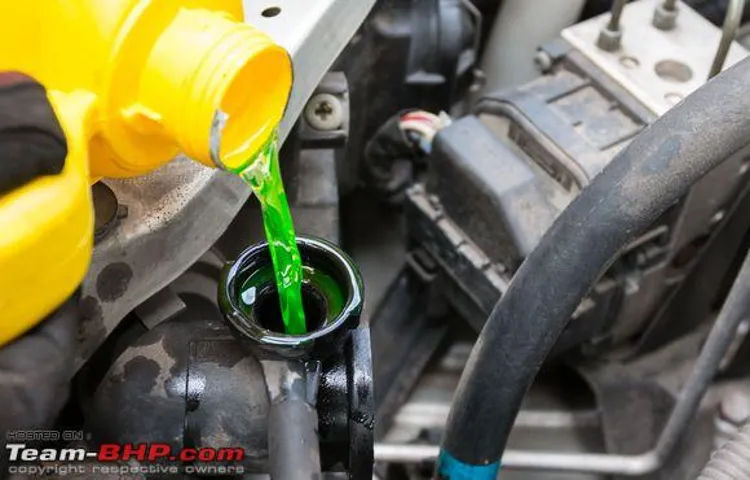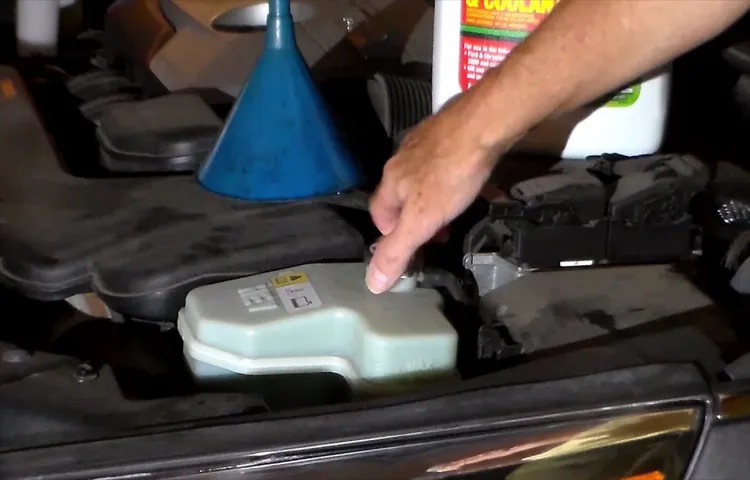Are you someone who finds themselves staring at their car and wondering what the heck coolant actually is and why it’s important? Don’t worry, you’re not alone! Coolant is an extremely important fluid that maintains the temperature of an engine, which can lead to serious problems if it’s not taken seriously. One of the most crucial steps in maintaining your car and avoiding breakdowns is to make sure that your coolant is at the proper level and strength. But what exactly is coolant? It’s a mixture of water and special chemicals that work together to absorb and transfer heat away from your engine.
This process keeps your engine at a stable temperature, preventing it from overheating or freezing. Think of coolant as your car’s personal air conditioner – without it, your engine would be running hot and bothered, leading to costly repairs down the line. In this blog, we’ll dive a little deeper into the importance of coolant, how it works, and some tips for keeping it in tip-top shape.
So buckle up and get ready to learn something new – your car will thank you for it!
Table of Contents
Definition
“What does coolant mean?” Well, in simple terms, coolant refers to the liquid or gas that is used to regulate the temperature in various machines and engines. Its main function is to absorb and remove the heat generated during the operation of the machine or engine, and then carry it away to prevent overheating. Coolant is commonly used in automobiles, HVAC systems, and industrial machinery.
In automobiles, coolant is circulated throughout the engine block, radiator, and hoses to prevent the engine from overheating. It can be either water-based or oil-based, and it may contain a mix of additives and chemicals to improve its performance and protect against rust, corrosion, and damage. So, the next time you wonder what coolant means, think of it as a vital component that maintains the optimal operating temperature of your machines and engines.
Coolant for Cars
Coolant for cars is an essential fluid used to keep engines cool and functioning efficiently. It is a mixture of water and antifreeze that circulates through the engine, removing heat and transferring it to the radiator where it can be dissipated. Antifreeze, usually made of ethylene glycol or propylene glycol, prevents the mixture from freezing in cold temperatures and also helps to prevent corrosion and other damage to the engine.
Maintaining the proper level of coolant is crucial to ensuring that your car runs smoothly and avoids overheating. Without coolant, your engine could suffer serious damage, such as warping or cracking of engine components. So, it’s important to keep a check on the coolant levels and fill up when necessary.
Using the right coolant mixture and changing it regularly is equally important to ensure optimal engine performance, longevity and to prevent expensive repairs due to engine wear and tear.

Coolant for Computers
Coolant for computers is a type of liquid that is used to regulate the temperature of computer components such as the CPU and GPU. These components can generate a lot of heat when operating, and if the temperature gets too high, it can cause damage to the components, resulting in poor performance or even failure. That’s where coolant comes in.
It helps to absorb the heat generated by the components and dissipate it into the surrounding environment. Coolant is usually made up of a combination of water and various chemicals such as glycol or ethylene glycol, which help to prevent corrosion and fungal growth. By keeping the temperature of your computer components under control, you can ensure that your computer runs smoothly and lasts longer.
So, if you use your computer for intensive tasks such as gaming or video editing, investing in a good quality coolant can be a wise decision.
Types of Coolant
Coolant refers to a liquid substance that transfers heat away from an engine to maintain a favorable operating temperature. There are two primary types of coolant that are commonly used in vehicles: ethylene glycol and propylene glycol. Ethylene glycol is a popular and efficient option for most vehicles, and it provides superior anti-freeze properties.
However, it is also toxic and extremely harmful to the environment if not disposed of correctly. Propylene glycol, on the other hand, is non-toxic and biodegradable, making it a safer alternative that is often found in eco-friendly coolant formulas. Both types of coolant typically come in various colors, with different additives to help keep engines running efficiently.
It’s essential to choose the correct formula for your vehicle and ensure that you maintain the appropriate mixture of coolant and water to avoid engine damage.
Inorganic Acid Coolants
When it comes to coolants, there are various types available, including inorganic acid coolants. Inorganic acid coolants generally consist of a mixture of water, corrosion inhibitors, and inorganic acids such as phosphoric acid. These types of coolants are primarily used in cooling systems for internal combustion engines in vehicles.
While inorganic acid coolants offer excellent heat transfer capabilities and are highly effective at preventing corrosion, they can be particularly challenging to handle due to their high acidity. Additionally, they may be more harmful to the environment compared to other types of coolants. It is crucial to choose the right coolant for your needs by considering factors such as performance requirements, environmental impact, and safety considerations.
Always consult with a professional for guidance on choosing the right coolant for your specific application.
Organic Acid Coolants
One type of coolant that is gaining popularity in the automotive industry is organic acid coolants. These coolants use a mixture of carboxylic acids and organic acids to reduce the risk of corrosion and improve the overall performance of vehicles. One of the biggest advantages of organic acid coolants is that they are eco-friendly and do not contain harmful chemicals like traditional coolants.
Additionally, they are long-lasting and can provide protection for up to 150,000 miles or five years. It is important to note that not all vehicles are compatible with organic acid coolants, and it is best to consult a professional before switching to this type of coolant. However, for those looking for a more sustainable and durable option, organic acid coolants are definitely worth considering.
Hybrid Organic Acid Technology Coolants
When it comes to coolant, there are different types to choose from based on various factors, such as the vehicle’s manufacturing requirements, personal preference, and environmental considerations. One popular type of coolant is the Hybrid Organic Acid Technology coolant. In contrast to traditional coolants that contain inorganic additives, Hybrid Organic Acid Technology coolants are mixed with organic acids.
These acids offer protection against corrosion for longer periods and maintain the engine’s efficiency. The coolants are compatible with most vehicle models and are easy to use, making them popular among car owners and mechanics. Additionally, Hybrid Organic Acid Technology coolants are eco-friendly as they are formulated without harsh chemicals that can harm the environment.
While there are various types of coolants, the Hybrid Organic Acid Technology coolant is a viable option for its enhanced performance and environmental friendliness.
Benefits of Coolant
What does coolant mean? Coolant is a type of liquid used in most engines to regulate the engine’s temperature and prevent it from overheating. Maintaining the required temperature of the engine is essential for reliable and efficient performance. Using coolant can also help prevent rust and corrosion inside the engine and keep the engine parts lubricated.
It is a mixture of water and ethylene glycol, propylene glycol, or other organic compounds that prevent freezing and boiling in extreme weather conditions. The coolant’s color can vary depending on the manufacturer, but it typically has a bright-colored hue. Choosing the right type of coolant is crucial for a vehicle’s longevity and performance, and it is important to follow the vehicle’s manufacturer’s recommended coolant.
So next time you’re wondering what coolant means, just remember that it is an essential liquid that helps keep your vehicle running smoothly and efficiently.
Reduce Engine Overheating
As a car owner, you may have experienced the alarming rise of your car’s temperature gauge to the red zone, indicating that your engine is overheating. This can be caused by various factors, such as a faulty radiator or a malfunctioning cooling fan. Whatever the cause, overheating can be dangerous for your engine and can lead to costly repairs.
This is where the benefits of coolant come in. Coolant, also known as antifreeze, protects your engine from overheating by absorbing heat and dissipating it through the radiator. It also prevents corrosion and rust buildup, keeping your engine parts in good condition.
Without coolant, your engine would be prone to overheating and eventually suffer damage. So, make sure to keep your coolant levels in check and get your cooling system regularly checked by a mechanic to prevent engine overheating and keep your car running smoothly.
Prevent Corrosion
Preventing corrosion is essential for ensuring the longevity and performance of your vehicle’s engine. One of the many benefits of using coolant is that it helps prevent corrosion within the engine. Corrosion can occur when metal parts in the engine come into contact with water or other contaminants, leading to rust and damage.
Coolant contains additives that protect these metal parts by forming a protective barrier and preventing any chemical reactions that may lead to corrosion. This helps keep your engine running smoothly, reducing the need for costly repairs or replacement parts. So, making sure to use coolant regularly can go a long way in preventing corrosion and keeping your engine in top shape.
Conclusion
In conclusion, coolant is like the superhero sidekick that no one really pays attention to until something goes wrong. It’s that essential fluid that keeps your engine from overheating and has the ability to save the day when things get heated (literally). So, next time someone asks you what coolant means, you can confidently say that it’s the unsung hero of your vehicle’s engine and the one thing that could prevent a disastrous breakdown.
Coolant, you may be small and often forgotten, but we appreciate and rely on you more than you know.”
FAQs
What is coolant and why is it important for a car?
Coolant is a liquid mixture of antifreeze and water that helps regulate the temperature of a car’s engine. It’s important because it helps prevent the engine from overheating, which can cause serious damage.
How often should I replace my car’s coolant?
It’s recommended to replace your coolant every 2-3 years or every 30,000 miles, whichever comes first.
Can I use water instead of coolant in my car’s radiator?
While water can be used in an emergency, it’s not recommended as a long-term coolant because it can lead to rust and corrosion in the engine.
What should I do if my car’s coolant level is low?
You should add a mixture of coolant and water to the radiator until it reaches the appropriate level. It’s important to use the correct mixture ratio as specified in your car’s owner’s manual.
What are the symptoms of a low coolant level in a car?
Symptoms of a low coolant level may include the engine overheating, a decrease in performance or power, or a warning light on the dashboard.
What happens if I overfill my car’s coolant?
Overfilling the coolant can lead to excessive pressure in the system, which can cause leaks or even damage to the radiator or hoses.
Can I mix different types of coolant in my car?
It’s not recommended to mix different types of coolant as they may have different chemical compositions that can lead to corrosion or other issues. It’s best to use the same type of coolant that is recommended for your car.


